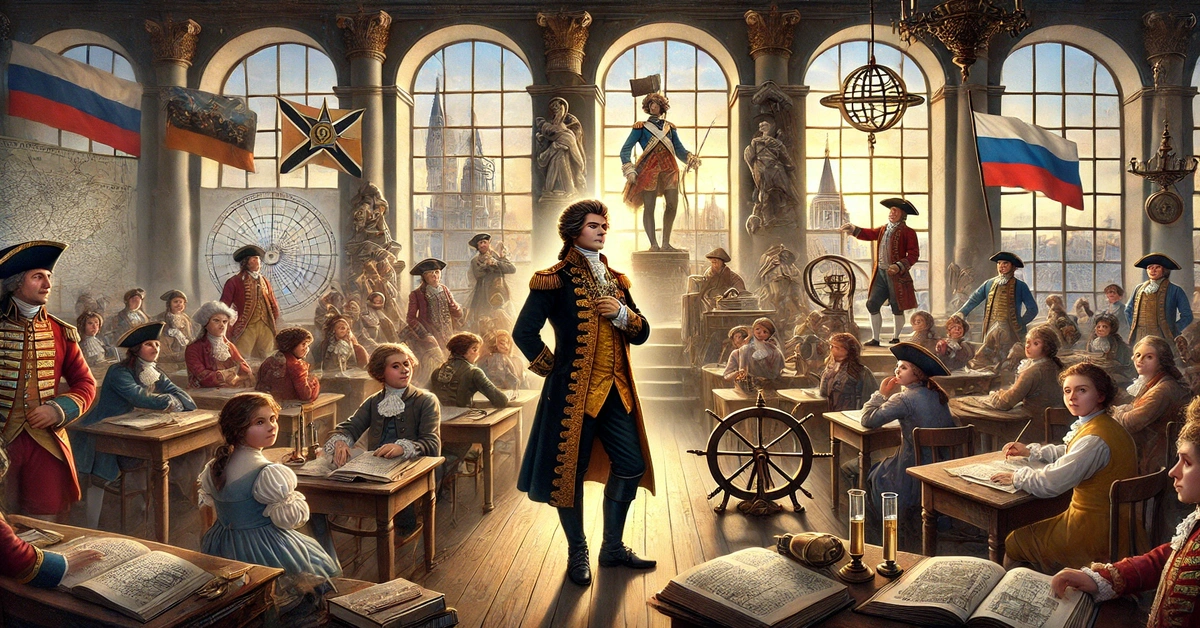Peter the Great one of Russia’s most renowned and transformative rulers changed the course of Russian history with his sweeping reforms. Among his many accomplishments education reform stands out as a cornerstone of his mission to modernize Russia and align it with Western Europe. Despite his limited initial education and years as a figurehead under his half-sister Sophia’s regency, Peter’s curiosity and relentless pursuit of knowledge propelled him to become the greatest reformer in Russian history. His dedication to improving education shaped Russia’s future, fostering a society equipped for advancements in science, art, and governance.
This article delves into how Peter the Great’s vision and policies overhauled Russia’s educational landscape and established the groundwork for a modernized nation.
The State of Education in Pre-Reform Russia
Before Peter the Great’s reforms, the Russian education system was deeply rooted in traditionalism, with limited focus on scientific and secular knowledge. Education was largely confined to religious teachings, and the ruling Boyar class—the nobility of the time—maintained strict control over what was taught.
- Limited Access to Education: Only the aristocracy and clergy had access to formal education, primarily focused on religious studies.
- Isolation from Western Knowledge: Russia’s educational system was largely disconnected from the intellectual advancements happening in Western Europe. As a result, it lagged in fields like science, engineering, and medicine.
- Reliance on Oral Tradition: Much of Russian culture and learning were passed down orally, further limiting the development of a formal, structured educational system.
Peter the Great’s vision for reform extended far beyond just modernizing his military and administration; he recognized the need for a knowledgeable and skilled populace to transform Russia into a formidable power.
Peter’s Personal Quest for Knowledge: A Catalyst for Change
Peter’s educational background was minimal, yet his drive to learn became the driving force behind his reforms. His travels through Europe, known as the “Grand Embassy,” exposed him to advanced educational institutions, scientific knowledge, and practical skills that Russia sorely lacked.
- Hands-On Learning: During his travels, Peter studied shipbuilding, military strategy, and European governance. This experience fostered his appreciation for technical and practical education.
- Inspiration from the West: Peter’s exposure to European knowledge systems motivated him to bring similar advancements to Russia, realizing that an educated populace was essential for progress.
- Drive to Modernize: Unlike previous rulers, Peter the Great believed in the transformative power of education. His personal quest for knowledge fueled his determination to implement educational reform in Russia.
Peter’s experiences inspired him to envision a Russia that embraced the sciences, the arts, and progressive thought. Upon his return, he was ready to introduce these ideals to his homeland.
Establishing New Schools and Institutions
To fulfill his vision, Peter the Great initiated the establishment of various schools and institutions across Russia, focusing on subjects that had been neglected in traditional Russian education.
- School of Navigation and Mathematical Sciences: Established in 1701, this was one of the first institutions dedicated to training students in mathematics, navigation, and naval engineering. It marked a major departure from the religious education previously prioritized.
- Medical Schools: Recognizing the importance of medicine for a healthy society, Peter founded medical schools to address Russia’s shortage of trained doctors. These institutions introduced anatomy, surgery, and other advanced fields of study to Russian scholars.
- Engineering and Artillery Schools: Peter’s military aspirations for Russia drove him to establish schools focused on engineering and artillery training, which strengthened Russia’s military capabilities and introduced advanced engineering concepts to Russian students.
These institutions marked the beginning of a systematic and secular approach to education, providing young Russians with technical skills crucial for a modern state.
The Role of Foreign Experts in Peter’s Educational Reforms
Peter the Great was acutely aware that Russia lacked expertise in many fields. To address this gap, he invited foreign experts to Russia, where they played a critical role in shaping the educational system.
- Hiring of European Educators: Peter enlisted educators, scientists, and engineers from Western Europe to teach in Russian schools. Their knowledge helped bridge the gap between Russia’s outdated educational practices and Europe’s advancements.
- Translation of Foreign Texts: To support his educational reforms, Peter commissioned the translation of scientific, medical, and technical texts into Russian, broadening access to knowledge and reducing reliance on oral traditions.
- Advisory Roles: Foreign experts not only taught Russian students but also advised Peter on how to build an educational system that could produce skilled professionals for the nation.
The contributions of foreign experts accelerated the development of Russia’s educational institutions, instilling a new standard of knowledge and professionalism.
The Introduction of Compulsory Education for Nobility
One of Peter’s most influential reforms was mandating education for the nobility. This policy ensured that Russia’s future leaders would be well-versed in science, mathematics, and foreign languages.
- Compulsory Education Decree: In 1714, Peter issued a decree requiring the children of nobility to attend schools, focusing on subjects like mathematics, geometry, and military science.
- Incentives and Penalties: To enforce compliance, Peter offered incentives for nobles who embraced education for their children while penalizing those who resisted.
- Focus on Practical Knowledge: Unlike the previous system that emphasized rhetoric and religious studies, Peter’s curriculum focused on practical subjects necessary for running an efficient, modern state.
This reform helped create a new generation of educated Russian leaders who were equipped to advance the empire’s political, military, and economic interests.
Reforming the Russian Orthodox Church’s Role in Education
The Russian Orthodox Church held a monopoly over education prior to Peter’s reforms. However, Peter sought to limit the Church’s influence and establish a secular education system that catered to the state’s needs.
- Secularization of Education: Peter’s reforms separated education from the Church, introducing subjects such as science, navigation, and languages that were previously ignored by religious institutions.
- Reduced Power of the Clergy in Education: While the Church retained control over religious instruction, its role in general education diminished significantly. This allowed for a broader curriculum that reflected Peter’s vision for a modern Russia.
- Theological and Secular Balance: Peter recognized the need to balance religious teachings with secular knowledge, encouraging a more well-rounded education for Russian students.
This shift laid the groundwork for a more secular society and promoted an open-minded approach to learning that would influence future educational reforms.
Lasting Impact of Peter’s Educational Reforms
Peter the Great’s reforms had a lasting impact on Russian education and society, paving the way for subsequent advancements and establishing a culture of learning that endured beyond his reign.
- Foundation for Modernization: Peter’s educational reforms set the stage for Russia’s transition into a powerful, technologically advanced nation capable of competing with Western Europe.
- Empowered Nobility and Skilled Workforce: By educating the nobility and establishing technical schools, Peter ensured that Russia’s ruling class and workforce would have the knowledge needed to build a strong economy and effective government.
- Influence on Future Generations: The institutions Peter founded served as models for future educational reforms, inspiring Tsars like Catherine the Great to continue advancing Russia’s intellectual and cultural development.
Through his dedication to educational reform, Peter the Great transformed Russia into a nation prepared for the challenges of the modern world.
Challenges and Criticisms of Peter’s Education Reform
While Peter the Great’s reforms brought significant benefits, they were not without challenges and criticisms.
- Resistance from the Nobility: Many members of the nobility were initially reluctant to embrace Peter’s emphasis on education, viewing it as unnecessary or burdensome.
- Language Barriers: The introduction of foreign educators and texts posed language challenges, as many Russians were unfamiliar with European languages.
- Limited Reach: While Peter’s reforms focused on the nobility and specific skilled professions, the majority of the Russian population remained uneducated, especially among the peasantry.
Despite these challenges, Education Reform by Peter the Great educational reforms remain a defining achievement of his reign, marking a turning point in Russian history.
Conclusion
Peter the Great’s education reforms were a monumental achievement, transforming Russia’s intellectual landscape and creating a foundation for modernization that would influence generations to come Education Reform by Peter the Great. His efforts to build secular institutions, bring in foreign experts, and mandate education for the nobility laid the groundwork for a more enlightened and capable society Education Reform by Peter the Great. Today, his legacy endures in the educational systems and intellectual culture of Russia, a testament to his belief in the power of knowledge to shape a nation Education Reform by Peter the Great.
FAQs
Why did Peter the Great focus on education reform?
Peter wanted to modernize Russia and believed that education was essential for the nation’s progress.
What institutions did Peter establish as part of his reforms?
He established schools for navigation, medicine, engineering, and the arts to provide practical and technical education.
How did Peter’s travels influence his views on education?
During his travels in Europe, he observed advanced educational systems, inspiring him to bring similar innovations to Russia.
Was education accessible to everyone after Peter’s reforms?
No, education primarily targeted the nobility, with the peasantry largely left out of formal schooling.
What impact did Peter’s reforms have on Russian society?
They laid the foundation for modernization, creating a more skilled and knowledgeable ruling class and workforce.
Did Peter the Great reduce the Church’s role in education?
Yes, he secularized education, shifting control from the Church to the state and introducing a broader curriculum.
What challenges did Peter face in implementing his educational reforms?
Resistance from the nobility, language barriers, and limited reach to the general population were key challenges.
How did Peter the Great’s educational reforms influence future Russian rulers?
His reforms inspired subsequent leaders like Catherine the Great to continue expanding and modernizing Russia’s educational system.







